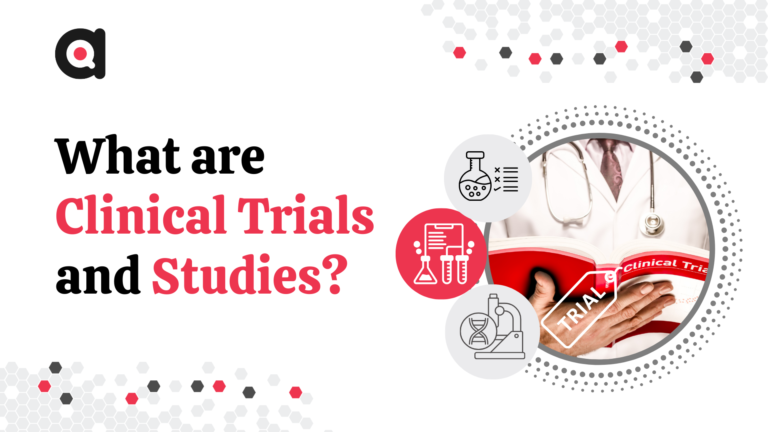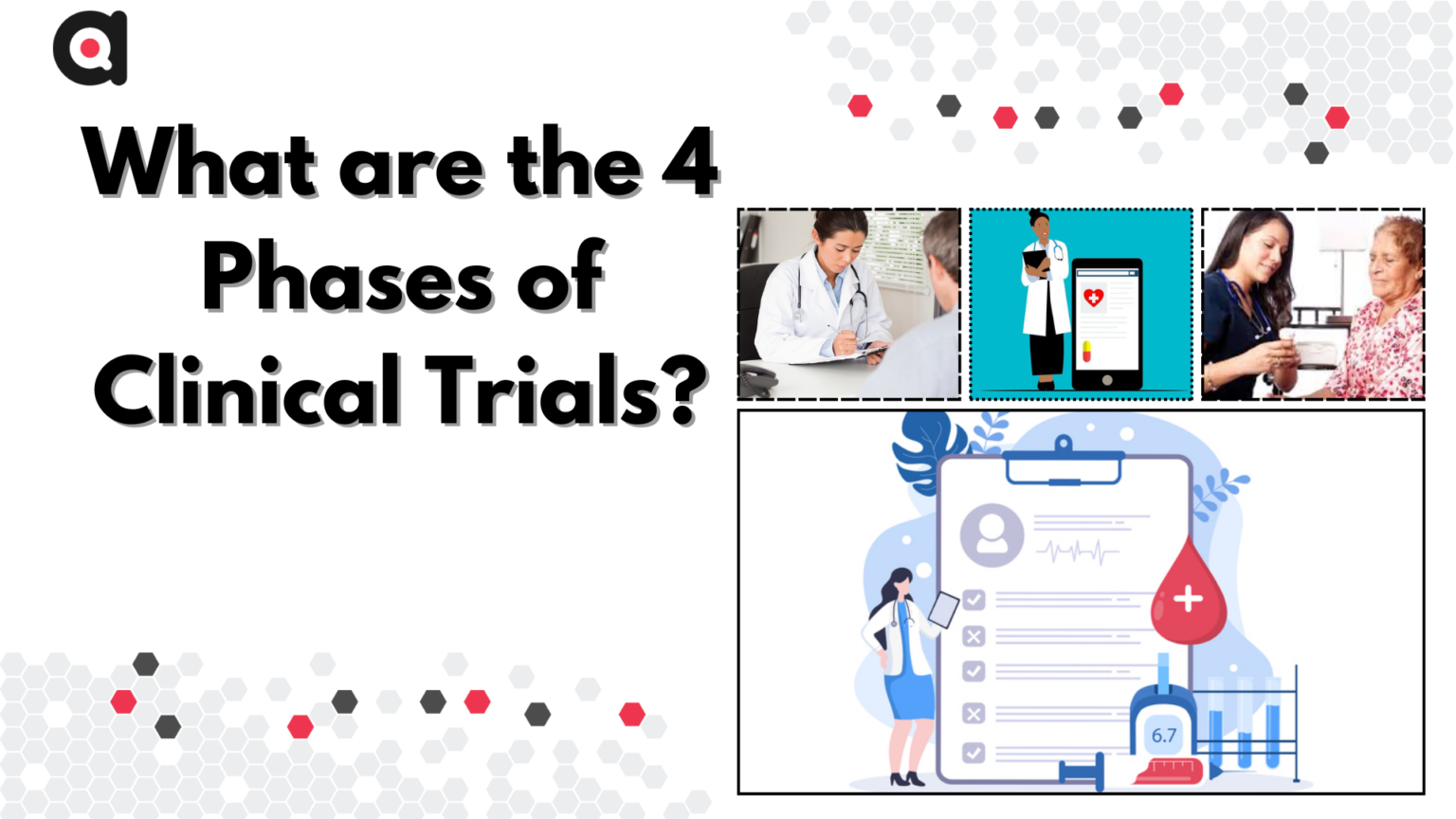The Ultimate Guide to Understanding What Are Clinical Trials and Studies
Table of Contents
Toggle
There are two main types of clinical research: observational studies and clinical trials. Observational Studies monitor individuals in normal settings, collecting information to observe changes over time. Whereas Clinical Trials are focused research studies that assess the impact of a medical, surgical, or Behavioural intervention on human participants.
Clinical trials are essential in determining whether a new form of treatment or prevention is safe and effective for use in the general population. Let’s discuss in detail to learn more about what are clinical trials and studies.
What Are Clinical Trials?
Clinical trials are systematic, controlled research studies conducted in humans to evaluate the safety, efficacy, and effectiveness of medical interventions. These interventions can include new drugs, therapies, or medical devices.
Let’s say a pharmaceutical company is conducting a clinical trial to assess the effectiveness of a novel drug in treating a specific type of cancer. The study involves a group of volunteers who meet specific eligibility criteria, and the participants are randomly assigned to receive either the new drug or a standard treatment. The trial aims to gather data on the drug’s safety, potential side effects, and overall impact on patients’ health outcomes.
Now after taking a quick overview to understand what clinical trials are, let’s move ahead to grab further details.
Why Clinical Trials Are Important?
Clinical trials stand as a fundamental pillar of medical research, driving advancements and enhancing the standard of healthcare outcomes for both individuals and communities.
Advancing Medical Knowledge
Clinical trials contribute significantly to the advancement of medical knowledge by uncovering new insights into diseases, treatment modalities, and human physiology. They form the basis for evidence-based medical practices.
Developing New Treatments
The development of new medications, surgical procedures, and medical devices is intricately tied to the results of clinical trials. Many of the treatments used today, such as chemotherapy and vaccines, would not exist without the pivotal role of research participants.
Improving Patient Care
Clinical trials play a direct role in enhancing patient care by validating the efficacy and safety of interventions. This, in turn, leads to the development of more effective and targeted treatments, ultimately improving health outcomes.
Regulatory Approval Processes
Regulatory agencies, such as the U.S. Food and Drug Administration (FDA) and the European Medicines Agency (EMA), rely on the results of clinical trials to determine the safety and efficacy of new interventions. Regulatory approval is a critical step before a new treatment becomes widely available.
How Clinical Trials Work?
After understanding what clinical trials are and their importance, it is imperative to grasp how clinical trials are conducted. Clinical trials are systematic investigations which involves the development of a detailed protocol, participant recruitment, randomisation, and blinding. The different trial phases assess safety, dosage, efficacy, and comparative effectiveness, collecting data through various methods. Researchers analyse results statistically, and if successful, regulatory approval follows for the intervention. Post-approval, continuous monitoring ensures sustained safety and effectiveness in real-world conditions.
Rest assured that a powerful Clinical Trial Management System like AQ CTMS proves instrumental in enhancing efficiency and ensuring seamless study management throughout every stage of clinical trials.
Study Inception
The journey of a clinical trial typically begins with the study’s inception. Researchers design protocols, plan logistics, and traditionally initiate the study manually. However, a well-built CTMS brings innovation to this stage through its AI-Driven Study Planning module. It optimises study designs, analysing historical data and patient demographics to enhance planning efficiency while minimising time and costs.
Participant Recruitment
As the study progresses, one of the significant challenges is participant recruitment. Identifying and enrolling eligible participants can be a cumbersome process. AQ CTMS integrates seamlessly with Patient Recruitment and Engagement Tools, facilitating quicker recruitment and engagement strategies. This integration ensures a more streamlined tracking of recruitment efforts, ultimately enhancing overall participant management.
Oversight and Scheduling
Scheduling and oversight are critical components in ensuring the smooth operation of clinical trials. Traditional methods often involve multiple manual processes, leading to inefficiencies. AQ CTMS steps in with its centralised platform for Scheduling & Oversight, providing real-time monitoring and efficient collaboration. This not only ensures compliance but also focuses on maintaining data quality throughout the trial.
Participant Monitoring and Data Accuracy
Data integration with Electronic Data Capture (EDC) systems and safety monitoring are crucial for maintaining data accuracy and participant safety. You can integrate a powerful CTMS with EDC systems to enhance Participant Monitoring & EDC Synchronisation. This integration allows for real-time tracking, safety monitoring, and data integration, contributing significantly to participant safety and overall data integrity.
Governance and Quality
Governance of crucial documents is fundamental for the integrity of clinical trials. AQ CTMS addresses this through its eISF module, streamlining the accumulation, data storage, version control, and governance of vital documents. This ensures regulatory compliance and quick identification of potential bottlenecks, contributing to the overall success of the trial.
Financial Management
Financial aspects, including budgeting and invoicing, can pose challenges if handled manually. Clinical researchers can use a CTMS as it streamlines the Financial Agreements & Remuneration System, offering a comprehensive solution for managing the financial aspects of clinical trials. This not only ensures transparency but also controls costs, ultimately accelerating processes.
Regulatory Compliance
Regulatory compliance is a cornerstone of clinical trials, and an agile CTMS can play a vital role in this aspect. It can facilitate Inspection Report Creation & Correspondence Automation, automating the creation of inspection reports and streamlining regulatory correspondence. This ultimately ensures a strong track record of compliance throughout the clinical research endeavours.
Data Analytics & Business Intelligence
Finally, the data analytics and reporting phase is critical for gaining insights into trial progress, patient enrolment, and resource allocation. AQ CTMS provides robust Data Analytics & Business Intelligence tools for real-time scrutiny and data-driven decision-making. This empowers researchers with detailed insights, allowing for quick adjustments and informed decisions.
How to Select Participants in Clinical Trials?
Diversity among participants is crucial to ensuring the applicability of research findings to a broad population. Including individuals of different ages, genders, races, and ethnicities helps researchers understand how interventions may affect diverse groups, promoting equitable healthcare outcomes.
Volunteer Eligibility Criteria
Clinical trial participants are volunteers who meet specific eligibility criteria. These criteria may include factors such as age, gender, medical history, and the presence of certain conditions. Inclusion and exclusion criteria ensure that the study population is suitable for the research objectives.
Informed Consent
Informed consent is a fundamental ethical requirement in clinical trials. Before participating, individuals must thoroughly understand the purpose, procedures, potential risks, and benefits of the study. Informed consent is an ongoing process, allowing participants to withdraw at any time.
What are Phases of Clinical Trials?
- Phase 0 or exploratory trials involve testing small doses of a new drug to understand its Behaviour in the body. While not as common as other phases, they provide valuable insights into the early characteristics of a potential intervention.
- Phase I trials take a a small group of participants to evaluate the safety, dosage, and potential side effects of the intervention. This phase lays the foundation for subsequent investigations.
- Phase II trials expand the participant pool to gather more data on safety and begin assessing the effectiveness of the intervention. This phase aims to provide preliminary evidence of efficacy in treating a specific condition.
- Phase III trials compare the new intervention with standard treatments to confirm its efficacy and monitor potential side effects. These trials involve a diverse population and are crucial in providing definitive evidence of the intervention’s benefits.
- Phase IV trials monitor the intervention’s long-term safety and effectiveness in real-world settings. This phase contributes to ongoing refinement of treatment strategies.
Final Words
Clinical trials play a pivotal role in determining the safety and efficacy of novel medical interventions, right? The absence of clinical trials could expose patients to the potential hazards of untested treatments, lacking assurance regarding their effectiveness. Conversely, improperly conducted trials may result in the approval of therapies with limited benefits or unforeseen adverse effects. The error-free execution of clinical trials is important for ensuring the integrity of evidence-based medicine, safeguarding patient welfare, and advancing healthcare with validated interventions.
We recommend leveraging AQ CTMS which seamlessly integrates into each stage of clinical trials, contributing to operational excellence, compliance with regulatory standards, and efficient management. Its role is foundational in ensuring the success of clinical trials for the advancement of medical research.
Related Articles

Industry News
The Ultimate Guide to Understanding What is a CTMS
A Clinical Trial Management System (CTMS) is a specialised, all-encompassing project management software tailored to guide a research team from the study’s inception—through the enrolment and oversight phases to the study’s conclusion…
AQ

Industry News
What is a Phase 4 Clinical Trial
Clinical trial Phase 4 is the post-marketing phase of drug development and is conducted after a drug has been approved to be available in the market. It assesses the introduced intervention’s long-term safety, effectiveness, and other aspects in real-world conditions.
AQ

